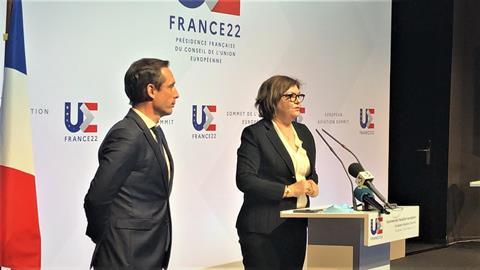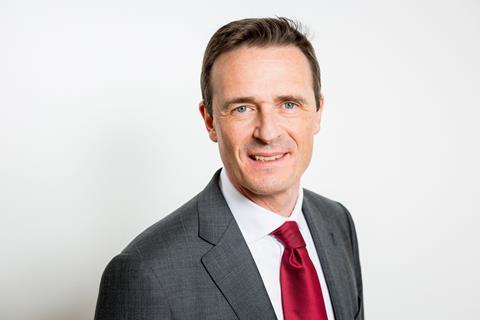Airlines for Europe (A4E) managing director Thomas Reynaert on why the landmark Toulouse Declaration on decarbonisation signed earlier in February by European governments and industry stakeholders must be followed by a commitment from ICAO at its triennial assembly this autumn.
More than 35 European countries and 146 industry stakeholder groups representing thousands of companies – including A4E airlines – on 4 February signed the Toulouse Declaration. This paves the wayfor both industry and governments to work together on our goal of reaching net zero CO2 emissions from aviation by 2050.
The Declaration was also supported by several non-EU countries, including Canada, the United States, Japan and Morocco.

This Declaration is the first-ever public-private initiative of its kind globally and fully aligns with our sector’s own Destination 2050 initiative, a collective commitment by Europe’s airlines, airports, aircraft manufacturers and air traffic management providers to reach net zero CO2 emissions by 2050, and which was warmly received by policymakers last February.
But while this is excellent news for our sector’s efforts in Europe – what about the rest of the world?
Global problems demand global solutions: Enter ICAO
Aviation is a global business. As we attempt to exit the worst crisis in our history, healthy competition has never been more important – both for airlines and their customers alike. That’s why a strong global framework to enable aviation’s decarbonisation to happen on an international scale must now be established and put into action – matching Europe’s ambition, while at the same time preserving a level playing field and international competitiveness.
Each of the Toulouse Declaration’s supporters have committed to working closely with ICAO towards the adoption of an ambitious “long-term aspirational goal” (LTAG) for aviation which is consistent with efforts to reach net zero CO2 emissions in 2050. Agreeing on global targets won’t be easy, but time is of the essence: Adoption of the LTAG would need to take place during ICAO’s 41st Assembly this September.
For the UN scheme and its credibility to be successful, Europe’s participation in CORSIA carbon offsetting scheme remains pivotal. Pending agreement on the LTAG, and given the absence of a better system, it is the sole way to tackle global CO2 emissions from aviation today.
The emissions reductions which are achievable on a global level go far beyond what is possible on a regional one. Global regulation is the only way we can avoid carbon leakage and competitive distortion between EU and non-EU airlines.
What’s next for Europe?
As one of the initiators of Destination 2050, we expect the Toulouse Declaration to be translated into concrete policy action, an “EU Pact for Aviation Decarbonisation” as we call it, between our sector and the EU institutions.
Our industry is already transitioning to a decarbonised future through improvements in aircraft and engine technologies, the development of sustainable aviation fuels, improvements in air traffic management and aircraft operations, as well as efficient economic measures. An effective policy, regulatory and financial framework is urgently needed at European and national level to support and accelerate this transformation.
Further development of these four pillars can bring significant emissions reductions under the European Green Deal whilst driving economic growth, employment, and Covid-19 recovery.
We need demand-driven solutions that can improve the efficiency of Europe’s air transport network as a whole whilst mitigating the socio-economic impact of climate policies. No region or social group should be left behind in our decarbonisation quest.
A balanced EU climate policy is therefore essential to allow aviation’s decarbonisation to happen whilst preserving the numerous social benefits aviation offers to EU citizens.
This outcome is within reach if done in close coordination between industry and policymakers. Thanks to the Toulouse Declaration, we’re already one step closer to reaching these goals now – but we need our international partners to show a similar commitment at ICAO.
A4E and its members support the Toulouse Declaration as we believe that a joint, public-private global effort is ultimately what is required to reach net zero CO2 emissions from aviation by 2050.
We urge the wider adoption of more ambitious decarbonisation objectives at the level of ICAO, including increasing the ambitions of CORSIA and related actions under a long-term aspirational goal.
Europe is privileged to play its part as a first mover and global ambassador for aviation’s decarbonisation efforts. But the time has come for other countries to play their part, as well. I hope that they will agree that there is no time to waste.
About the author: Thomas Reynaert is managing director of Airlines for Europe, the region’s largest airline association established in 2016 by Air France-KLM, EasyJet, IAG, Lufthansa Group and Ryanair. It counts 16 leading airlines and airline groups as its members.

Efforts to decarbonise the industry will be among the topics discussed at the sixth annual A4E Aviation Summit, to be held in Brussels on 31 March. More details here.

